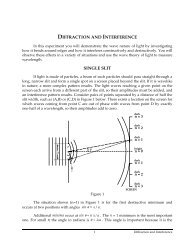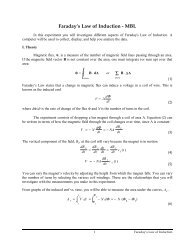- Page 1 and 2:
spec X-Ray Diffraction SoftwareUSER
- Page 3 and 4:
specX-Ray Diffraction SoftwareCerti
- Page 5 and 6:
TABLE OF CONTENTSUSER MANUAL AND TU
- Page 7 and 8:
Reciprocal Space Macros ...........
- Page 9 and 10:
Preface For the Interim ManualWe ap
- Page 11 and 12:
USER MANUAL AND TUTORIALS
- Page 15 and 16:
files is then identified (/usr/loca
- Page 17 and 18:
denotes variable parameters you sup
- Page 19 and 20:
spec also keeps track of software m
- Page 21 and 22:
13.FOURC> mvr th 114.FOURC>will mov
- Page 23 and 24:
8 0.98 0 0 17603 38839 19 0.99 0 0
- Page 25 and 26:
4.FOURC> p date(1e9)Sat Sep 8 21:46
- Page 27 and 28:
Controlling Output Tothe Printer an
- Page 29 and 30:
By convention, global variables in
- Page 31 and 32:
16.FOURC> for (i = 0; i < MOTORS; i
- Page 33 and 34:
When a macro definition contains ar
- Page 35 and 36:
38.FOURC> undef com39.FOURC> prdef
- Page 37 and 38:
43.FOURC> lsdef *scanEscan (1448) a
- Page 39 and 40:
diffractometer. For example, they m
- Page 41 and 42:
set_lim(motor_number, low, high) an
- Page 43 and 44:
66.FOURC> getcounts; printf("%s = %
- Page 45 and 46:
the number of bytes is less than n
- Page 47 and 48: PLOT-> fnscans.4 options scan-numbe
- Page 49 and 50: #S number Starts a new scan. number
- Page 51 and 52: ShowscansThe showscans program is a
- Page 53 and 54: REFERENCE MANUAL
- Page 55 and 56: IntroductionThe material contained
- Page 57 and 58: ArraysArrays are formed using squar
- Page 59 and 60: Numer ic ConstantsNumeric constants
- Page 61 and 62: !! Redo the previous command.!14 Re
- Page 63 and 64: In some installations, spec is inst
- Page 65 and 66: ExitingA spec session is normally t
- Page 67 and 68: DEBUG — is a user-assignable nume
- Page 69 and 70: USER — is string valued and is se
- Page 71 and 72: The concatenation operator comes in
- Page 73 and 74: The second form of the for statemen
- Page 75 and 76: These are the grammar rules:express
- Page 77 and 78: local identifier-list [ ; ]syms pat
- Page 79 and 80: Utility Functions and CommandsAll f
- Page 81 and 82: .sp N — spaces N lines. Without a
- Page 83 and 84: ¢The formatting commands:.RB .BR .
- Page 85 and 86: "ischr" or "−c" — Returns true
- Page 87 and 88: polled devices, spec needs to perfo
- Page 89 and 90: "show_prdef_files" — When this mo
- Page 91 and 92: EOS sequence are read or until the
- Page 93 and 94: ¡with dlog or ends with .dlog . De
- Page 95 and 96: 10.FOURC> def change_it ’{11.quot
- Page 97: tty_cntl(cmd) — Sends terminal-sp
- Page 101 and 102: ¤£ ¢prdef pattern ... — As abo
- Page 103 and 104: at the end of the line.Within a mac
- Page 105 and 106: config file. Built-in code for the
- Page 107 and 108: RS-232 Serial InterfacesSerial func
- Page 109 and 110: vme_put32(addr, data [, dmode ])
- Page 111 and 112: In addition, device-dependent value
- Page 113 and 114: correction. If val is given, then t
- Page 115 and 116: ¡and is set in the config file. Th
- Page 117 and 118: ¡data_grp(grp, npts, wid) — Conf
- Page 119 and 120: "min" — Returns the minimum value
- Page 121 and 122: "xlog" — Use a logarithmic x axis
- Page 123 and 124: continued line, appropriate for sav
- Page 125 and 126: LIBS= parameters. If the tools prov
- Page 127 and 128: ¡void set_return_data(double *x, i
- Page 129 and 130: split(string, array) — Splits the
- Page 131 and 132: STANDARD MACRO GUIDE
- Page 133 and 134: IntroductionThe standard macros inc
- Page 135 and 136: the argument is not a valid mnemoni
- Page 137 and 138: Utility MacrosUNIX CommandsThese si
- Page 139 and 140: # View (and modify), then reread co
- Page 141 and 142: if ("$1" != ".") {DOFILE = "$1"if (
- Page 143 and 144: Star t-up MacrosThese macros ask fo
- Page 145 and 146: Motor Macrosmv motor posmvr motor p
- Page 147 and 148: Change a motor limitdef set_lm ’i
- Page 149 and 150:
# Where - all motorsdef wa ’waitm
- Page 151 and 152:
# "count" is the basic macro to cou
- Page 153 and 154:
Reciprocal Space MacrosThe followin
- Page 155 and 156:
Scan MacrosThe following sections s
- Page 157 and 158:
Basic Reciprocal Space Scanshscan s
- Page 159 and 160:
def Pheader ’printf("\n Setpoint
- Page 161 and 162:
’}Here are examples of _settemp m
- Page 163 and 164:
Pr inter Initializa tion MacrosThes
- Page 165 and 166:
’X_L = motor_name(_m1)_sx = _s1 ;
- Page 167 and 168:
space scans, the limit check must l
- Page 169 and 170:
}}Pheaderprintf("\noffpprintf(" ")_
- Page 171 and 172:
# The loop macro, called by all the
- Page 173 and 174:
FOUR-CIRCLE REFERENCE
- Page 175 and 176:
IntroductionWhen invoked by the nam
- Page 177 and 178:
Once properly configured, diffracto
- Page 179 and 180:
Four-CircleModesAs noted above, bec
- Page 181 and 182:
asurface, keeping α small will kee
- Page 183 and 184:
¢¢¢¢Sector sSectors correspond
- Page 185 and 186:
Four-CircleFilesMost questions rega
- Page 187 and 188:
U[14] g_l0 or0, setor0 L of primary
- Page 189 and 190:
’gpset A[mA[1]] g_u01gpset A[mA[2
- Page 191 and 192:
global REFLEX # Variable for file n
- Page 193 and 194:
To calculate the new lattice parame
- Page 195 and 196:
ADMINISTRATOR’S GUIDE
- Page 197 and 198:
IntroductionThe first section of th
- Page 199 and 200:
The distribution will be in tar for
- Page 201 and 202:
¢KSC 3929 SCSI-CAMAC file location
- Page 203 and 204:
Installing Driver sIn the early his
- Page 205 and 206:
Fine Tuning the HardwareConfigurati
- Page 207 and 208:
...*gparam[3] = 1.54;...if (*gparam
- Page 209 and 210:
Makefile, and /usr/local/lib/spec.d
- Page 211 and 212:
Ena bling E/ISA I/O Por ts On HP 70
- Page 213 and 214:
ˆW Gain wizard access to set prote
- Page 215 and 216:
CA_LC2301CA_LC3512CA_LC3521CA_LC358
- Page 217 and 218:
MCU_O As above, but with old PROMsM
- Page 219 and 220:
config file that has the most motor
- Page 221 and 222:
the edconf program set-user id spec
- Page 223 and 224:
HARDWARE REFERENCE
- Page 225 and 226:
Introductionspec includes built-in
- Page 227 and 228:
DSP 6001/6002 CAMAC With No Driverc
- Page 229 and 230:
Kinetic Systems CAMAC Softwareconfi
- Page 231 and 232:
Any of the National Instruments boa
- Page 233 and 234:
National Instruments SB-GPIB Ver 1.
- Page 235 and 236:
modified version of the standard li
- Page 237 and 238:
Bit 3 Model 616/617 PCI-VMEBit 3 Mo
- Page 239 and 240:
Motor Controller sAdvanced Control
- Page 241 and 242:
panel controls. Youshould consult t
- Page 243 and 244:
Huber SMC 9000 (GPIB)config file:GP
- Page 245 and 246:
motors on the board) and clears the
- Page 247 and 248:
translation stages, the maximum val
- Page 249 and 250:
MOTORS DEVICE ADDR MODE NUM TYPEYES
- Page 251 and 252:
The driver is contained in the file
- Page 253 and 254:
30.FOURC> print motor_par(tth, "rea
- Page 255 and 256:
free-axis-displacement commands "L+
- Page 257 and 258:
PMC Corporation DCX-100 (Serial and
- Page 259 and 260:
Motor ParametersThe steps per deg/m
- Page 261 and 262:
Timer s and CountersAm9513-based Co
- Page 263 and 264:
DSP RTC-018 Real Time Clock (CAMAC)
- Page 265 and 266:
Kinetic Systems 3610 6-Channel 50 M
- Page 267 and 268:
Or tec 974/994/995/997 NIM Timer s
- Page 269 and 270:
Setting Operational ParametersThe c
- Page 271 and 272:
mca_par("first_ch") — returns the
- Page 273 and 274:
Oxford/Tennelec/Nucleus PCA Mutlipo
- Page 275 and 276:
mca_par("preset") — in PHA mode,
- Page 277 and 278:
¢REFERENCESJournal articles descri
- Page 279 and 280:
camac program, 199cat macro, 127cd
- Page 281 and 282:
opening, 6selecting, 6standard form
- Page 283 and 284:
saving to output device, 132scan, 1
- Page 285 and 286:
number,35, 37output, customizing, 1
- Page 287 and 288:
wait() function, 33, 68, 77, 78, 99
- Page 289 and 290:
¡spec (1) (CSS Utilities) spec (1)





